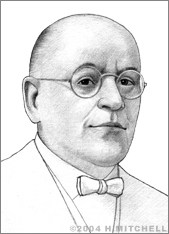Will Kellogg
What would breakfast be without Kellogg’s Corn Flakes®? The inventor of this classic cold cereal, eaten around the world every day for nearly a century, was Will Keith Kellogg, born on April 7, 1860 in Battle Creek, Michigan.
Kellogg was educated up until the sixth grade. He was a hard worker who, as a youth, held jobs as a stockboy and then as a traveling salesman of household brooms for his father’s broom-making business. His older brother John Harvey Kellogg was a doctor. He rose to the rank of physician-in-chief at a world-famous local hospital and health spa called the Battle Creek Sanitarium. Will Kellogg eventually went to work at the sanitarium alongside his brother. He began as a clerk and later became a bookkeeper and file manager.
At the sanitarium, Will became acutely interested in the world of medicine and learned a great deal from his brother, a vegetarian, about good nutrition and wholegrain foods. He began to help John conduct research and develop healthy diets for patients. He was in the process of boiling wheat in an attempt to create an easily digestible bread substitute when he came across a discovery that led to the creation of Kellogg’s Corn Flakes in 1894.
He had boiled some wheat with the intention of making dough, and he accidentally let it stand for several hours. The wheat became softened and tempered. He decided to put it through the regular rolling process for baking anyway. When he rolled it out, however, he noticed that the individual wheat berries in the mash rolled out into flat, wide flakes. He figured he’d bake them and see what happened. The result was a crisp, tasty, easy-to-eat cereal product. He and his brother decided to serve the flakes to patients to see what they thought.
The patients loved them – so much, in fact, that they began asking the brothers to ship packages of the flakes, which the Kelloggs called “Granose,” to them after they left the sanitarium. They did so on a small scale, but meanwhile, the younger Kellogg had tried the technique with corn and refined what he believed to be a superior tasting, crunchy product. In 1898, he and John started the Sanitas Food Company as a mail-order operation to develop and sell corn flakes cereal. But Will had bigger plans: to turn his corn flake business into a large-scale, international, packaged food enterprise.
In 1906, he established the Battle Creek Toasted Corn Flakes Company, the world’s first ready-to-eat cereal company. He was a gifted marketer and promoter, and in his first year, he shipped 175,000 cases of corn flakes. Within just a few years, Kellogg's Corn Flakes were a household name that could be found in nearly every kitchen in the United States.
He quickly began adding to his product line, with Kellogg's Bran Flakes® in 1915, Kellogg's All-Bran® in 1916, and Kellogg's Rice Krispies® in 1928. He renamed his business the W.K. Kellogg Company in 1922 and expanded operations to Canada and Australia in 1924, followed by Europe and Asia.
Today, the company produces their foods in 18 countries and distributes them in over 180. In addition to its broad cereal line, today Kellogg’s also sells Pop-Tarts®, Eggo® waffles and pancakes, the Nutri-Grain® cereal bar line, and a variety of other snacks.
Kellogg retired as the company's president in 1929 but stayed on as chairman of the board until 1946. At this stage in his life, he turned his focus to philanthropic activities, establishing one of the nation’s most renowned charitable institutions, the W. K. Kellogg Foundation, in 1934 with an initial donation of $66 million. He was a true believer in empowering individuals to help themselves, and he began his charity work in 1925 with the formation of the Fellowship Corporation, which helped to build an agricultural school, experimental farm, and reforestation project. In 1930, he was named a delegate to the White House Conference on Child Health and Protection by President Herbert Hoover. Later that year, he established the W.K. Kellogg Child Welfare Foundation.
He died in Battle Creek on Oct. 6, 1951.


